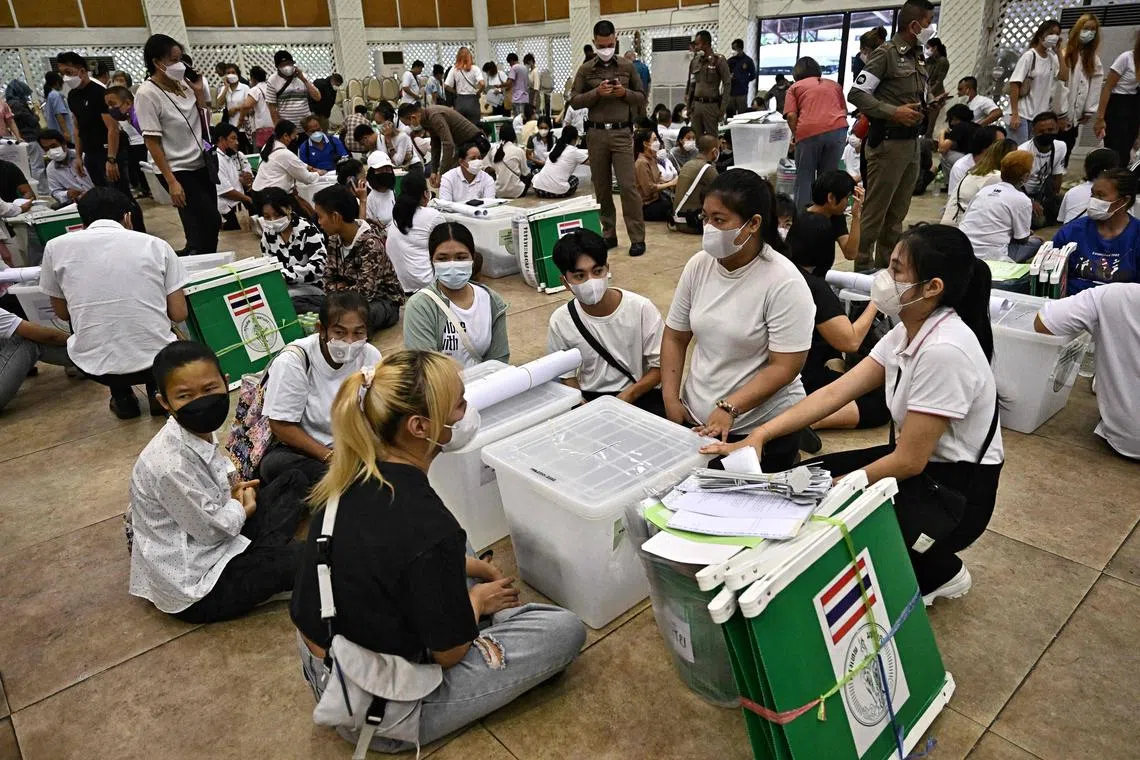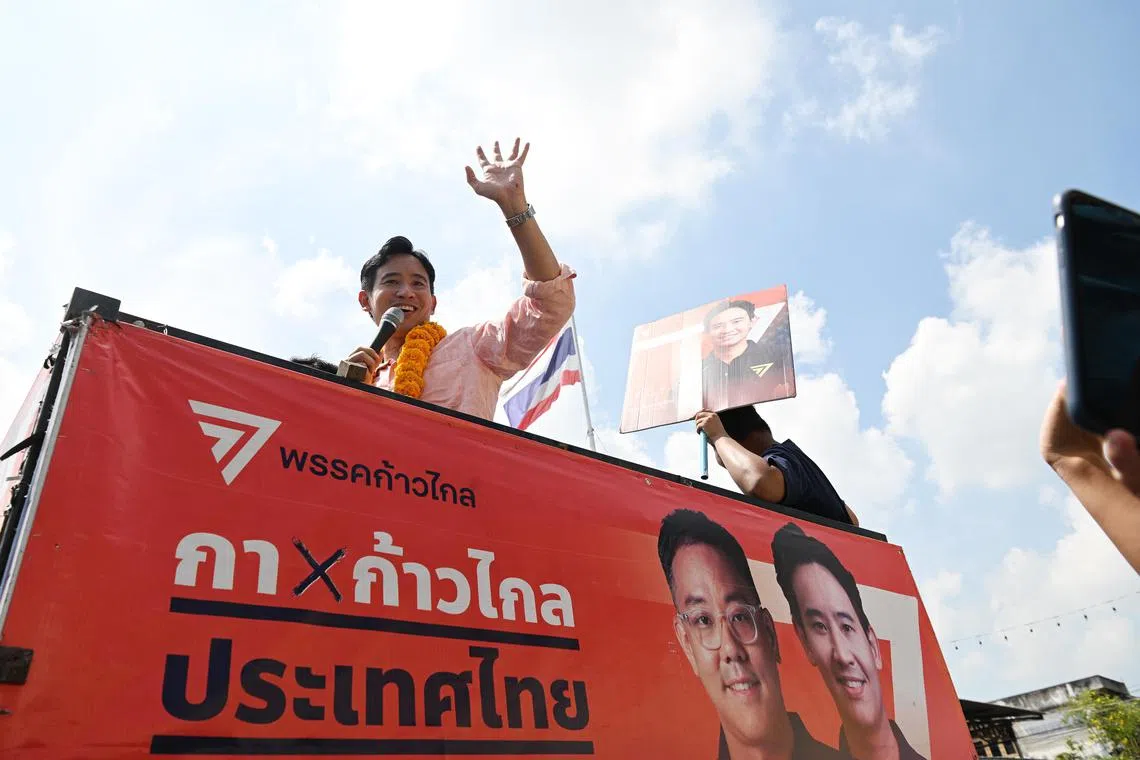Thailand to decide between change and continuity in today’s general election
Sign up now: Get insights on Asia's fast-moving developments

Election Commission volunteers inspecting ballots and voting materials on Saturday for distribution to polling booths in Bangkok.
PHOTO: AFP
BANGKOK – Thailand heads to the polling booth on Sunday
After weeks of campaigning, the general election on Sunday boils down to yet another battle between military-backed conservative parties seeking to preserve the status quo and more liberal opposition groups, which are pushing for change.
It will be up to voters across the 77 provinces to decide the fate of the country, which has been lagging behind its South-east Asian peers in terms of economic growth and forecasts, and where household debt has surged to one of the highest levels in the region.
Incumbent Prime Minister Prayut Chan-o-cha is making his bid for re-election, urging voters to choose his United Thai Nation (UTN) party so that he can continue the work he started in 2014, when he ousted the elected Pheu Thai administration in a coup.
But with pre-election opinion polls suggesting opposition parties’ overwhelming popularity for both the premiership and the 500 seats up for grabs in Parliament’s Lower House, political change could be imminent as the 52 million-strong electorate votes at the ballot box.
The main opposition Pheu Thai Party – the front-runner in the election – is looking to return to power, and promises to uplift the economy and livelihoods with a host of policies to raise wages and stimulate the economy.
These include a one-time 10,000 baht (S$394) giveaway deposited into the digital wallet of every Thai who is 16 and older.
“We are at a critical stage. If you look at all the economic data, we cannot afford to wait any more. We need a unified government, a government that can work immediately,” one of Pheu Thai’s prime ministerial candidates, Mr Srettha Thavisin, 60, told The Straits Times as the party made its last campaign visit to Bangkok’s Siam area a day before the polls.
The former real estate tycoon is one of three candidates the party has nominated as its choice for prime minister. The other two are 74-year-old Chaikasem Nitisiri and 36-year-old Paetongtarn Shinawatra, daughter of former prime minister Thaksin Shinawatra.
Pheu Thai, an offshoot of Thaksin’s defunct Thai Rak Thai Party, is asking voters to give it a “landslide” win that will allow it to overcome a parliamentary system that favours military-linked parties.
To form the government, a party or a group of parties will need to clinch at least 251 of the 500 Lower House seats. To become prime minister, a candidate must win more than half the support of Parliament, which is made up of the 500 to-be-elected MPs and 250 junta-appointed senators.
But while Thaksin-linked parties have won the most seats in every election since 2001, political analyst Punchada Sirivunnabood said it will be tough for Pheu Thai to secure its goal of a landslide victory and form a single-party government.
She indicated that it is more likely that the results will necessitate the formation of a coalition government.
“There is likely to be change in terms of which party leads the government, but Pheu Thai will still probably have to seek support from others if it wants to comfortably form the government,” added Dr Punchada.
The party is not just facing off against conservative groups like the Bhumjaithai, Palang Pracharath and UTN parties. It is also contesting against opposition ally Move Forward Party (MFP), with whom it shares a liberal, pro-democracy voting base.
The progressive MFP has been making gains among voters and some public surveys show that the popularity of its party leader, Mr Pita Limjaroenrat, has now surged beyond that of Pheu Thai’s front runner, Ms Paetongtarn, to emerge as the public’s favoured candidate for premier.
“On May 14, vote for the MFP to change Thailand forever. Vote for the future, not the past. Vote because of hope, not because of fear,” Mr Pita told a packed stadium on May 12

Move Forward Party’s prime minister candidate, Mr Pita Limjaroenrat, has enjoyed a late surge in popularity polls.
ST PHOTO: STEPHANIE YEOW
This general election is the first to be held since youth-led protests in 2020, when demonstrators called for Mr Prayut to step down and controversial amendments to be made to Thailand’s Constitution and the status of its monarchy.
The movement sparked a new wave of politically conscious and emotionally charged young voters, and judging from the masses that have turned up at MFP rallies, many are supportive of its promises for reform and radical change.
Among MFP’s campaign pledges are the end of mandatory military conscription, a break-up of the big monopolies that dominate the economy, and a rewrite of the military-backed Constitution, including amending the strict lese majeste laws that protect the royal institution from insult.
But conservative factions have latched on to this as their rallying cry, most notably Mr Prayut’s UTN party, which is warning voters that they must “protect” the monarchy and existing social order.
“I wish to make this land the land of peace; that it is safe and people live in harmony. We do not want change that overturns the nation. Do you know what harm that will do?” Mr Prayut told supporters on May 12 at the Queen Sirikit National Convention Centre.
While the UTN has been trailing behind in popularity polls, it enjoys immense support from older generations, said Dr Punchada, adding that while its nationalistic tone might not sit well with the younger generation, it works with the conservative camp.
“It is a good technique to make conservative voters choose the (UTN) above all other parties in the same camp. It secures their support,” she said.
But the results of Sunday’s polls will not be the end of the political battle, warned Dr Punchada, and it could be weeks or months before official results are announced and the government and prime minister are confirmed.
“It is just the start. After the polls, depending on what they win, parties will start to negotiate for their roles and seats in the future coalition government,” she said.



